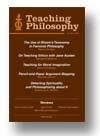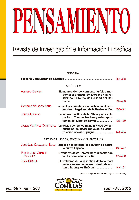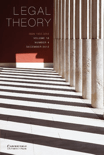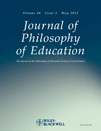
EDUCATIONAL THEORY
Scope & Guideline
Illuminating Pathways in Educational Theory and Practice
Introduction
Aims and Scopes
- Philosophical Foundations of Education:
The journal emphasizes the philosophical underpinnings of educational theories, examining how concepts from figures like Dewey, Nietzsche, and Arendt inform contemporary educational practices. - Ethical Dimensions in Education:
A consistent focus is placed on the ethical implications of educational practices, including discussions on justice, equity, and the moral responsibilities of educators. - Interdisciplinary Approaches:
The journal encourages interdisciplinary research, integrating perspectives from sociology, psychology, and political theory to enrich educational discourse. - Critical Pedagogy and Social Justice:
It highlights critical pedagogy, advocating for education as a means of social justice, and examining the role of education in addressing societal inequalities. - Normative Case Studies:
The journal promotes the use of normative case studies as a methodological approach to explore ethical dilemmas and practical challenges in education. - Continental Philosophy in Education:
A unique contribution of the journal is its engagement with continental philosophy, exploring how these theories can inform educational practices and understanding.
Trending and Emerging
- Education for Social Justice:
An increasing number of papers address the role of education in promoting social justice, exploring how pedagogical practices can combat inequality and empower marginalized voices. - Ethics and Epistemic Responsibility:
Emerging discussions focus on ethical considerations in education, particularly around epistemic responsibility and the implications of knowledge production in teaching. - Interdisciplinary Frameworks:
There is a growing trend towards interdisciplinary research that integrates insights from various fields, such as sociology, political theory, and ethics, to address complex educational issues. - Critical Race Theory and Education:
The journal is increasingly publishing work that engages with critical race theory, reflecting a heightened awareness of race and power dynamics within educational contexts. - Philosophical Engagement with Technology:
There is a trend towards examining the philosophical implications of technology in education, including discussions on AI, digital citizenship, and the ethical dimensions of educational technology.
Declining or Waning
- Traditional Educational Models:
Discussions centered around traditional educational models and methodologies have decreased, indicating a shift towards more innovative, progressive approaches that challenge established norms. - Behaviorist Approaches:
There has been a notable decline in the focus on behaviorist theories of learning and teaching, suggesting a movement towards more constructivist and holistic educational frameworks. - Empirical Research Focus:
The journal has seen less emphasis on empirical research methodologies, as it increasingly prioritizes theoretical and philosophical explorations over data-driven studies. - Standardized Testing and Accountability:
Themes related to standardized testing and accountability measures in education are less frequently discussed, possibly reflecting a growing critique of these practices within the educational community. - General Pedagogical Techniques:
There is a waning focus on generic pedagogical techniques, as articles increasingly delve into nuanced, context-specific pedagogical approaches rather than broad instructional strategies.
Similar Journals

Teaching Philosophy
Transforming Educational Practices with Philosophical InsightsTeaching Philosophy is a renowned academic journal dedicated to the in-depth exploration and critical examination of philosophical dimensions in education. Published by the Philosophy Documentation Center, the journal has been a cornerstone in the field since its inception in 1977, providing a rich resource for educators, researchers, and students interested in the philosophical underpinnings of teaching and learning. With an ISSN of 0145-5788 and an E-ISSN of 2153-6619, it serves as a vital platform for disseminating research that bridges the gap between philosophy and educational practice. Although currently not an open-access journal, Teaching Philosophy maintains a significant impact within its field, reflected by its impressive quartile rankings—Q4 in Education and Q2 in Philosophy, as well as its Scopus rankings that position it within the top half percentile of both the Philosophy and Education categories. The journal aims to foster scholarly dialogue on diverse philosophical topics in pedagogy, ensuring that insights from philosophy continue to inform and enhance educational practices. Whether one is a seasoned philosopher or a budding educator, Teaching Philosophy presents an invaluable avenue for enriching understanding and engagement in the discipline.

Filozofska Istrazivanja
Unlocking New Insights in Philosophical ResearchFilozofska Istrazivanja is a distinguished open-access journal dedicated to the field of philosophy, published by the Croatian Philosophical Society. Since its inception, the journal has provided a platform for the dissemination of philosophical research, fostering scholarly dialogue and critical engagement within the discipline. With an ISSN of 0351-4706, this journal has been freely accessible to readers since 2005, reflecting its commitment to promoting knowledge and accessibility in the academic community. As measured by its Q4 in Philosophy category quartile for 2023 and its Scopus ranking of #770/806 in the Arts and Humanities field, Filozofska Istrazivanja continues to serve as a crucial resource for researchers, educators, and students alike seeking to explore contemporary philosophical issues and debates. The journal encourages submissions that contribute to various philosophical subfields, enriching the discourse and providing new insights that can elevate the understanding of philosophical thought.

LAW AND PHILOSOPHY
Challenging Doctrines, Shaping FuturesLaw and Philosophy is a distinguished academic journal published by Springer, focusing on the intersection of legal studies and philosophical inquiry. With an esteemed impact factor reflecting its influence in the field, the journal has achieved notable ranks, placing it in Q2 in Law and Q1 in Philosophy as of 2023. Readers can access it through institutional subscriptions, emphasizing its role in enriching debates around law's philosophical underpinnings. This journal, with its inception in 1982 and continuing through 2024, provides a platform for innovative ideas, fostering dialogue among researchers, professionals, and students. It aims to publish cutting-edge articles that challenge existing doctrines and propose new theoretical frameworks, making it essential for anyone engaged in the critical study of law and its philosophical ramifications.

Paideusis-The Journal of the Canadian Philosophy of Education Society
Cultivating Ideas for Tomorrow's EducatorsPaideusis - The Journal of the Canadian Philosophy of Education Society serves as a vital platform for scholarly discussion and inquiry within the field of philosophy of education. Published by the Canadian Philosophy of Education Society (CPES) and embracing an Open Access model since 1987, this journal fosters an inclusive environment for researchers, educators, and students seeking to engage with contemporary educational theories and practices. With an emphasis on philosophical reflection and critical analysis, Paideusis invites contributions that challenge and extend our understanding of educational paradigms, making it a crucial resource for those committed to advancing discourse in education. The journal not only aims to promote intellectual engagement but also to cultivate a community where new ideas can flourish, ultimately shaping the future of educational thought and practice.

PENSAMIENTO
Innovating Ideas for a New Philosophical EraPENSAMIENTO is a distinguished journal published by the Universidad Pontificia Comillas Madrid, Faculty of Philosophy, providing a platform for scholarly discourse in the field of philosophy. With its ISSN 0031-4749 and E-ISSN 2386-5822, the journal has embraced Open Access since 2016, promoting wider dissemination of philosophical research and thought. Located in Spain, it has established itself as a vital resource for academics, researchers, and students interested in contemporary philosophical inquiries and discussions. As of 2023, PENSAMIENTO is ranked Q3 in the Arts and Humanities, specifically within the Philosophy category, highlighting its emerging impact in the scholarly community with a Scopus rank of #575 out of 806, placing it in the 28th percentile. With its coverage spanning from 2002 to 2024, PENSAMIENTO is committed to contributing to the ongoing evolution of philosophical thought and ensuring that fresh perspectives can thrive within academia.

Legal Theory
Innovating Perspectives on Law and EthicsLegal Theory, published by Cambridge University Press, stands as a significant academic journal dedicated to the exploration of the conceptual foundations and implications of law within the wider realm of philosophy. Established in 1995 and maintaining a consistent publication record through 2023, the journal has garnered a reputation for its high-quality scholarly contributions, reflected in its impressive rankings: Q2 in Law and Q1 in Philosophy as of 2023. With an impactful presence in the Scopus Ranks, Legal Theory is positioned 158th in Philosophy and 337th in Law, highlighting its relevance and influence—especially within the arts and humanities. This journal serves as a critical platform for researchers, professionals, and students who seek to engage with the intricate interplay between legal norms and philosophical inquiries. Though not open access, it offers a wealth of knowledge that is integral to advancing discourse in legal philosophy, making it an essential resource for those looking to deepen their understanding of contemporary legal theories and their implications.

TEACHERS COLLEGE RECORD
Fostering Intellectual Growth in the Realm of EducationTeachers College Record is a prestigious academic journal in the field of education, published by SAGE Publications Inc., that has been a leading resource since its inception in 1976. This journal serves as a platform for scholarly articles, research studies, and critical analyses that inform and advance the understanding of educational theory, policy, and practice. With an impressive Scopus Rank placing it at #490 out of 1543 in the Social Sciences - Education category and a Q2 quartile ranking for 2023, it is recognized for its rigorous peer-review process and significant contributions to the field. Researchers, educators, and students can expect to find cutting-edge discussions on contemporary issues, innovative methodologies, and evidence-based practices. Although the journal does not currently offer open access, it remains a vital asset for those dedicated to enhancing educational outcomes and fostering intellectual discourse.

Radical Teacher
Transforming Pedagogy Through Critical DialogueRadical Teacher, published by the University of Pittsburgh, University Library System, is a significant academic journal in the field of education, focusing on critical pedagogy and innovative teaching practices. With an ISSN of 1941-0832, this open-access journal has been committed to accessible educational scholarship since 2013, aiming to foster dialogue and action in social justice education. Situated in the United States, the journal supports researchers, educators, and students alike by providing a platform for diverse voices and alternative perspectives in the educational landscape. Though it currently holds a Q4 classification in education, the journal plays a crucial role in expanding the discourse on education reform and advocating for comprehensive pedagogical change. The publication, encompassing contributions from various educational disciplines, aspires to impact readers by stimulating critical conversations around the complexities of teaching and learning within contemporary societal contexts.

JOURNAL OF PHILOSOPHY OF EDUCATION
Inspiring New Perspectives on Educational Theory.JOURNAL OF PHILOSOPHY OF EDUCATION, published by Oxford University Press, serves as a premier platform for interdisciplinary research at the intersection of education, history, and philosophy. Established in 1967, this journal has consistently contributed to the academic discourse by publishing insightful articles that challenge conventional thinking and inspire innovative pedagogical practices. With a distinguished ranking in the top quartiles of History and Philosophy and a respectable Q3 position in Education, it occupies a significant niche in the scholarly community. The journal's high Scopus rankings signify its impact, being placed in the 94th percentile for History and the 86th percentile for Philosophy. It welcomes contributions that explore theoretical frameworks, historical contexts, and practical implications of philosophical inquiries into education. Although it does not currently offer Open Access options, the journal remains a vital resource for academics and practitioners seeking to deepen their understanding of educational philosophy. With contributions expected to continue until 2024, the JOURNAL OF PHILOSOPHY OF EDUCATION is poised to remain a crucial avenue for advancing educational thought and research.

Power and Education
Advancing Critical Conversations in EducationPower and Education, published by SAGE Publications Ltd, is an esteemed journal that explores the intricate relationship between power dynamics and educational practices. With its E-ISSN of 1757-7438, the journal provides an essential platform for scholars and practitioners in the fields of education, sociology, and political science. Since its inception in 2009, the journal has maintained a consistent focus on critical issues in education, aiming to illuminate how structures of power influence educational systems and outcomes. Recognized for its academic rigor, it ranks in the Q3 quartile for Education and Q2 for Sociology and Political Science as of 2023, underscoring its significance in these disciplines. Although the journal does not currently offer open access options, it remains a vital resource for researchers seeking to engage with contemporary debates and research. By bridging theory and practice, Power and Education plays a crucial role in advancing our understanding of the power dynamics that shape educational landscapes, making it a must-read for those committed to fostering equitable educational practices.